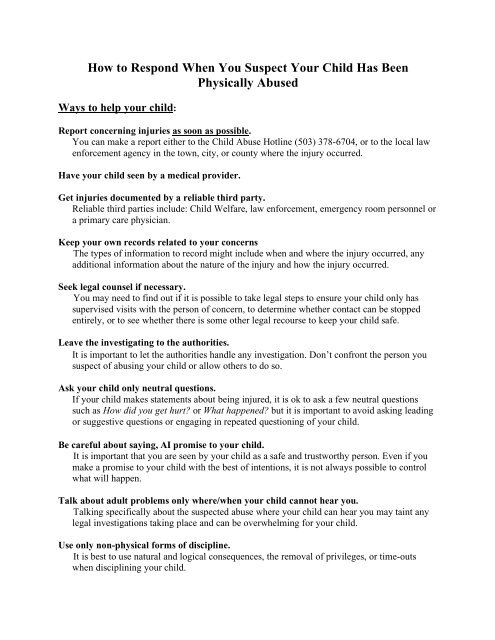Responding to Physical Abuse Concerns - Liberty House
Responding to Physical Abuse Concerns - Liberty House
Responding to Physical Abuse Concerns - Liberty House
You also want an ePaper? Increase the reach of your titles
YUMPU automatically turns print PDFs into web optimized ePapers that Google loves.
How <strong>to</strong> Respond When You Suspect Your Child Has Been<br />
<strong>Physical</strong>ly <strong>Abuse</strong>d<br />
Ways <strong>to</strong> help your child:<br />
Report concerning injuries as soon as possible.<br />
You can make a report either <strong>to</strong> the Child <strong>Abuse</strong> Hotline (503) 378-6704, or <strong>to</strong> the local law<br />
enforcement agency in the <strong>to</strong>wn, city, or county where the injury occurred.<br />
Have your child seen by a medical provider.<br />
Get injuries documented by a reliable third party.<br />
Reliable third parties include: Child Welfare, law enforcement, emergency room personnel or<br />
a primary care physician.<br />
Keep your own records related <strong>to</strong> your concerns<br />
The types of information <strong>to</strong> record might include when and where the injury occurred, any<br />
additional information about the nature of the injury and how the injury occurred.<br />
Seek legal counsel if necessary.<br />
You may need <strong>to</strong> find out if it is possible <strong>to</strong> take legal steps <strong>to</strong> ensure your child only has<br />
supervised visits with the person of concern, <strong>to</strong> determine whether contact can be s<strong>to</strong>pped<br />
entirely, or <strong>to</strong> see whether there is some other legal recourse <strong>to</strong> keep your child safe.<br />
Leave the investigating <strong>to</strong> the authorities.<br />
It is important <strong>to</strong> let the authorities handle any investigation. Don’t confront the person you<br />
suspect of abusing your child or allow others <strong>to</strong> do so.<br />
Ask your child only neutral questions.<br />
If your child makes statements about being injured, it is ok <strong>to</strong> ask a few neutral questions<br />
such as How did you get hurt? or What happened? but it is important <strong>to</strong> avoid asking leading<br />
or suggestive questions or engaging in repeated questioning of your child.<br />
Be careful about saying, AI promise <strong>to</strong> your child.<br />
It is important that you are seen by your child as a safe and trustworthy person. Even if you<br />
make a promise <strong>to</strong> your child with the best of intentions, it is not always possible <strong>to</strong> control<br />
what will happen.<br />
Talk about adult problems only where/when your child cannot hear you.<br />
Talking specifically about the suspected abuse where your child can hear you may taint any<br />
legal investigations taking place and can be overwhelming for your child.<br />
Use only non-physical forms of discipline.<br />
It is best <strong>to</strong> use natural and logical consequences, the removal of privileges, or time-outs<br />
when disciplining your child.
Ways <strong>to</strong> help yourself:<br />
Get support for yourself.<br />
<strong>Liberty</strong> <strong>House</strong> can provide family support and referrals <strong>to</strong> other agencies <strong>to</strong> help both parents<br />
and children.<br />
Stay consistent.<br />
It is important that your and your child’s lives stay as normal or consistent as possible. The<br />
exceptions <strong>to</strong> this are any changes that need <strong>to</strong> be made <strong>to</strong> ensure your child’s safety.<br />
Recognize the resiliency in your child.<br />
Children are remarkably resilient. In fact, children often bounce back quicker from adverse<br />
situations than do adults. If you can recognize the resilience in your child, can provide<br />
supportive resources such as counselling should your child need this, and can continue <strong>to</strong><br />
keep your child safe, the long-term effects of the abuse should be greatly reduced.<br />
Contact <strong>Liberty</strong> <strong>House</strong> with Questions.<br />
The mission of <strong>Liberty</strong> <strong>House</strong> is <strong>to</strong> serve as the hub of our community’s response <strong>to</strong> child abuse.<br />
We can provide families with information about abuse, can help direct families <strong>to</strong> appropriate<br />
resources for themselves and their children and, especially when a child has current injuries<br />
which can be documented, may be able <strong>to</strong> schedule an evaluation of the child.<br />
If you have any additional questions about what <strong>to</strong> do if you suspect your child has been<br />
physically abused or about resources that are available for you and your family, please contact<br />
<strong>Liberty</strong> <strong>House</strong> at (503) 540-0288.












